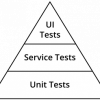Related Content
 |
6 Signs Your Agile Project Isn’t Really Agile There's a trend of organizations declaring they are agile without actually changing how they develop software. Declaring that an apple is an orange doesn’t make it so. These six key indicators can help you determine whether your agile project isn’t really agile after all—and give you some solutions to help. |
|
 |
2018 Hour of Code: Let’s Dance What kid doesn’t love a dance party? With aliens and sharks that drop, double down, and dab? Introduce kids to the basics of computer science in a way that doesn’t elicit “I’m boooored” with Dance Party, the draw for the 2018 Hour of Code. Do a little dance, make a little code! |
|
 |
5 Reasons You Should Have More Unit Tests The test pyramid is a valuable visual in agile. In particular, it argues that unit tests should make up the majority of tests, and while agile teams recite this principle, it is often not clear why it is so important. Here are five reasons unit tests should make up the majority of tests written for an application. |
|
 |
Feature Branching Is Not Evil Some people believe branching and pull requests are inherently bad. True, branching done poorly can slow down a team, but advocating for avoiding branching altogether can lead you to ignore the more important goal of an agile process: rapid integration of changes. First, make sure you're considering the right metrics. |
|
|
|
4 Ways to Increase Software Quality and Decrease Test Time Software testers are continually under pressure to test faster without sacrificing quality. By taking the perspective that quality is the responsibility of the entire team, not just the testers, shorter test cycles with higher quality software are possible. Here are four ways the whole team can improve releases. |
|
 |
Designing a Smart QA Strategy With increasingly complex and sophisticated technologies being used in testing, quality has to become a smart activity. A smart QA strategy is both about building smart models and making smart choices. We must keep in mind the balance between manual and automated solutions and which are needed to accomplish our goals. |
|
 |
Making Testing Visible Most testing work is invisible—something that happens inside your head and leaves no artifacts behind. This generally leaves testers feeling like no one understands what they do all day. Here are some ideas for collaborating with your coworkers so they can see—and start to understand—your testing work. |
|
 |
Crowdsourcing Emerging Manufacturing and Water Security Technology Borrowing from the successful NASA Challenges playbook, the US Department of Energy recently launched several crowdsourcing efforts to incentivize new applications and technologies in additive manufacturing, also known as 3D printing, and transforming nontraditional water sources into resources. |







